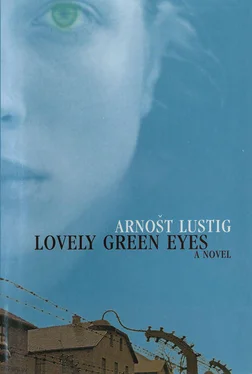“A girl like you is like a heavenly body,” he joked. “They only show one side. I’d like to understand you. But first you have to understand me.”
He was treating her like a servant. And she felt like one. She would imagine that she was tidying up a room. She would accept that all employers had their whims. That brought her closer to the Obersturmführer without her realizing it. She could not know that he had just judged her young, healthy and generally fit — maybe not the best material, but in the circumstances and considering where they were, better than nothing.
“As a rule I get on well with a girl like you.”
He was filled with a sense of superiority. He knew there was no harm in working on a girl, especially one as young as this one, with words first, before it came to hands and body. He could afford to take his time. He blamed himself for not feeling at ease with himself, as he would have liked. Why was he sweating? Was he too close to the stove?
With no-one else had she been so aware, right from the first moment, that she was Jewish. She wrapped herself in caution. She could not compare him to Captain Hentschel. She would have to remain careful.
He searched her face. Surely she must realize that his eyes were boring into her? Perhaps she was telling the truth. She was not that old and all Jews, with rare exceptions, had vanished from the region. Was she blushing? Perhaps he was imagining it. He was convinced that Jews did not blush. It was a matter of the quality of blood. He could not recall now where he had heard that. To be on the safe side, crossing with dark-haired, dark-eyed partners would be forbidden in his family. That would be his legacy to future generations. Nor anyone below army regulation height, or with doubtful background. That was if he ever had a real family. So far his immediate and wider family were the Einsatzgruppen. Rankers, NCOs and commanders, including the supreme Führer. The Nazi Party. The élite, the only ones with whom he felt an equal among equals.
He regarded it as a lucky accident that the initials of his name were S.S. Stefan Sarazin. He always introduced himself as “Stefan Sarazin, Obersturmführer in the Waffen-SS,” stressing the sibilants.
“You were blushing?” he asked.
“I’m not blushing.”
“I should hope not. Do you know how to recognize a non-Aryan reliably? He hasn’t enough blood in him to blush.”
She was unable to guess the colour of his eyes. They were like the openings of two empty beer bottles. Poorly-blown glass. He reminded her of a girl she’d known with cataracts.
“The Lebensborn organization used this place,” he said. “I was invited here for a week. Together with my colleagues I impregnated my quota. We were a dozen chosen men under 25 from the Waffen-SS, without an iota of Jewish blood. The master race. Vigorous individuals who could trace their family tree as far back as 1775. Thirty-year-old German women who haven’t found a husband are reporting for the Lebensborn. The state takes care of them and ensures that they become mothers.”
He was drawing her into his world. She tried to guess his age. Not more than 25 or 26. She was afraid he might show her photographs. He was shorter than she was. It was a good thing that Captain Hentschel had not come again. Still, the previous night she had slept in his green pullover.
He fixed his milky eyes on her mouth, then they slid down, but not all the way to her boots.
“You have small breasts. We’ll see more when you take your clothes off.”
“I don’t know. Yes, I have small breasts.”
“And a small bottom.”
“I can’t see my back.”
“Is everything you have small?”
“I don’t know.”
“You should know. You’re new, aren’t you?”
“I’ve been here a fortnight.”
“Do you get enough to eat?”
“Yes,” she said quickly.
“You’re keen on food?”
“No, I’m not.”
“Perhaps you should be,” said the Obersturmführer.
“I only give the best, the very best, if you know what I mean.”
She didn’t say that she did not know.
“I’d know if you lied to me.” He gave a brief smile. “We’ll see.”
She was afraid of the ambiguity of his remarks. She looked for something in what he left unsaid.
He decided to play with her a while longer. She had a nice little oblong face. He felt the heat coming from the flue and from the cast-iron barrel of the stove. A few red-hot cinders were dropping through the grate. He found it agreeable to stand in the warmth and look out of the window at the blizzard. So far it had not abated. He hoped it wouldn’t bury his car. He looked again at his prostitute. Her colour had come back, but the general impression was still one of pallor. Was she perspiring too, or did it merely seem so to him? And was she half-closing her eyes, perhaps looking at his pistol?
“Are you afraid to die?”
“Why?”
“Are you questioning me or am I questioning you?”
“I don’t know,” she said.
“In a while I shall know more about you than you do yourself.”
He didn’t know yet if he would reward or punish her. Was she undernourished? Compared to her, his own features were bursting with health. He thought of Pomeranian Jewesses. They were dark-haired, though some of them had ginger hair like the girl before him. The Einsatzgruppen had used them as targets for their machine gunners.
“You might think I’m obsessed with the Jews,” he said. “But it’s handed down from generation to generation. It gives me self-confidence, as if I were drinking life-giving water.”
After a pause the Obersturmführer said, “We don’t have anything to regret, wasn’t it the Jews who claimed that a good lawyer was better than the truth?”
“I don’t know,” she said.
She tried to answer politely, with humility rather than rebelliousness.
“How come you speak German?”
“I learnt it.”
“I’m glad to hear it. Did they tell you I liked redheads?”
“No.”
“Girls with long legs and your complexion? What did they tell you about me?”
“Only that you would come.”
His eyes seemed to her like a well without water. Or a puddle which had dried up after a shower. She thought of the muddy bank of the Harmanze lake. She resisted speculating who the Oberführer was; it was enough to know what he had come for. What he would want. There was brutality in his eyes, and a moment later also sickness and fastidiousness. At once determination and confusion, a kind of uncertainty which was confirmed by his words. Why had he asked her if she was afraid of death?
He had chosen Skinny because Ginger had failed him the last time. So ein Luder! She had been given a flogging. For a third complaint she would go to Festung Breslau. He had stayed to watch the Madam flog her. After the third lash on her bare bottom she had kissed his boots. And Long-Legs was too big for him. How much did a girl like that eat? And how much, it occurred to him, did a thin girl like this one, get into her stomach? Maybe she had threadworm, like he had had as a child. It amazed him, the number of superfluous and useless stomachs Germany was nourishing. Weren’t the simple soldiers, the workers and the peasants and the teachers, right when they said that he who does not work, neither shall he eat? The Nazis had widened this to include the unhealthy, the incurably sick, the feeble-minded, the ailing. One had to have the courage to cut into one’s own flesh. Cut out all tumours, large and small. Perhaps he should tell this little whore how they brought up their children in ancient Sparta, how the king erected a small rail over an abyss and if an infant lost its grip and fell into the abyss he would congratulate its mother for having spared Sparta a weakling. The Nazis would transform Germany into a modern Sparta.
Читать дальше


![Корнелл Вулрич - Eyes That Watch You [= The Case of the Talking Eyes]](/books/32103/kornell-vulrich-eyes-that-watch-you-the-case-of-thumb.webp)









